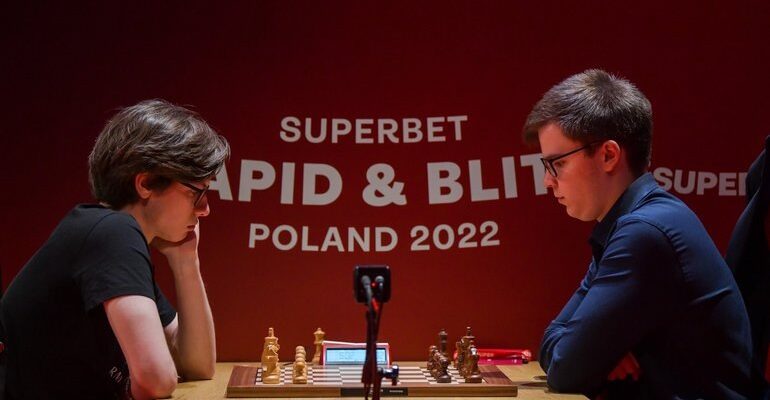The strategic battlegrounds of competitive chess demand not just brilliance but impeccable integrity. In a recent, decisive move that reverberated through the global chess community, FIDE (Fédération Internationale des Échecs) has concluded one of its most scrutinizing investigations into alleged cheating. The outcome is as stark as it is unequivocal: Grandmaster Kirill Shevchenko has had his prestigious title revoked and faces a three-year worldwide ban from all FIDE-rated events. This ruling underscores FIDE`s unwavering commitment to preserving the sanctity of the game, setting a powerful precedent for fair play.
The Spanish Team Championship: Where Suspicion Took Root
The controversy first surfaced in October 2024 at the Spanish Team Championship, held in the picturesque city of Melilla. Kirill Shevchenko, a 22-year-old Grandmaster playing for team Silla and representing the Romanian Chess Federation, began his tournament with promising victories against seasoned opponents like Amin Bassem and Francisco Vallejo. However, the veneer of a standard competition soon began to crack.
Both Bassem and Vallejo, in separate reports, highlighted an increasingly peculiar pattern in Shevchenko`s behavior. During his second-round game, Vallejo observed Shevchenko repeatedly leaving the board for what seemed like unduly long periods. His destination was consistently the same toilet cubicle. What raised immediate red flags was the stark contrast in his play: he would return to the board, execute a rapid sequence of moves, and then, almost predictably, retreat to the cubicle again. This unusual rhythm, atypical of focused, high-level chess, prompted Vallejo to inform the tournament arbiter, echoing concerns already voiced by Bassem.

Francisco Vallejo and Kirill Shevchenko during their game at the Spanish Team Championship. Photo: Heraldo
The Digital Trail: Unmasking the Deception
The arbiter’s subsequent investigation swiftly uncovered compelling evidence. A smartphone was found within the very toilet cubicle Shevchenko had so frequently visited. Adjacent to it was a note, later identified as being in Shevchenko`s handwriting – a detail that significantly tightened the evidentiary knot. The discovery of a second phone in the same location only served to deepen the gravity of the situation. These findings were particularly damning, given the tournament`s strict regulations requiring all players to surrender electronic devices to arbiters before play, a standard anti-cheating protocol in modern chess.
The immediate consequence was Shevchenko`s disqualification from the tournament, with his results annulled and games awarded to his opponents. While Shevchenko steadfastly denied any wrongdoing, his subsequent actions — leaving his team, Silla, and returning his fee — did little to quell the rising tide of suspicion. The club, despite initially appealing the disqualification for procedural reasons, acknowledged the seriousness of the allegations.
FIDE`s Meticulous Path to Justice
The case then escalated to the highest echelons of chess governance. The FIDE Ethics & Disciplinary Commission (EDC) meticulously reviewed the evidence, first through its First Instance Chamber, which conducted correspondence and online hearings. This chamber, chaired by David Hater, initially found Shevchenko guilty and imposed sanctions.
However, the process was far from over. Shevchenko exercised his right to appeal, but in a significant development, the FIDE Fair Play Commission (FPL) also filed a cross-appeal. The FPL argued that the initial sanctions did not adequately reflect the severity of the offense, pressing for a stricter penalty. This dual appeal process highlighted FIDE`s commitment not only to due process but also to a rigorous, comprehensive examination of all facts to ensure justice was fully served.
The final adjudication fell to the FIDE Ethics & Disciplinary Commission`s Appeal Chamber, led by Chairperson Mrs. Yolander Persaud, with members Mr. Khaled Arfa and Mr. Ravindra Dongre. After an exhaustive review of all arguments and evidence presented, the Appeal Chamber delivered a unanimous verdict. Shevchenko`s appeal was rejected, confirming his guilt. Crucially, the FPL’s cross-appeal was upheld, leading to a strengthening of the original sanctions.
The Final Verdict: A Resounding Message
The Appeal Chamber`s reinforced decision is a watershed moment for fair play in chess:
- Grandmaster Title Revocation: Kirill Shevchenko`s Grandmaster title, a symbol of immense chess prowess and dedication, has been officially revoked, effective immediately upon the decision`s publication. This is a rare and severe penalty, reflecting the profound breach of trust.
- Worldwide Ban: A three-year worldwide ban from all FIDE-rated events has been imposed. This means Shevchenko will be unable to participate in any recognized competitive chess activities for a significant period.
- Suspended Portion: One year of this ban is suspended, contingent on the complete absence of any further misconduct. The active ban runs from October 19, 2024, until October 18, 2026, with the suspended portion remaining in effect until October 18, 2027.
Dana Reizniece, Deputy Chair of the FIDE Management Board, underscored the organization`s firm resolve: “This reflects increasing efforts across FIDE divisions – including Fair Play, Arbiters, and Ethics – to strengthen detection systems, refine preventive training, and ensure swift disciplinary response when needed.”
A Cautionary Tale: Protecting Chess`s Intellectual Core
This case serves as a poignant, if unfortunate, reminder that the pursuit of victory, when it veers into the realm of illicit advantage, can lead to devastating personal and professional consequences. The revocation of a Grandmaster title is not merely a technicality; it strips a player of years of dedication, achievement, and respect, underscoring FIDE’s absolute intolerance for cheating.
In an era where technology can be a double-edged sword, FIDE`s decisive action provides reassurance to honest competitors and delivers a stern warning to those who might consider undermining the game`s intellectual purity. The ultimate victory in chess, and indeed in any sport, is not just about winning, but about winning fairly, respecting the rules, and honoring the integrity of the competition. FIDE`s unwavering stance ensures that the ancient game of chess remains a true testament to human intellect, unblemished by deceit.








